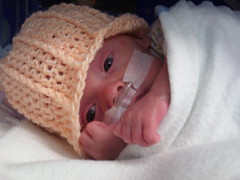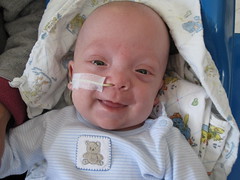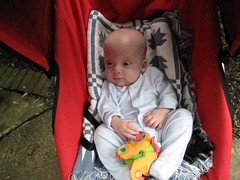This Friday will mark our ninth week of involvement with the neonatal intensive care unit (NICU). Our high-intensity exposure to esoteric knowledge has, as one would expect, changed us. As Bernard Shaw remarked, "every profession is a conspiracy against the laity." We've spent the past nine weeks deeply enmeshed with the initiates of medical knowledge.
We have force-fed ourselves knowledge about the human body. We now have a rudimentary grasp of the functioning of the body's cerebrospinal fluid system, including, most critically, its ventrical reservoirs; by the same token, we know a lot more than we did about hydrocephalus and ventriculomegaly. When I was a teenager I used to suffer from pulmonary oedema; this was just an introductory course in the many pathologies of the infant lung that we have learnt about. We know what look for in a blood gas reading. Scientists claim to have discovered a 'second brain' in the gut? It makes perfect sense to us given that the intestines have to operate as a miniature chemical plant and thus need to be densely populated with nerve cells. Dropsy isn't just a term from medieval texts. We know what kidneys do.
We understand medical hierarchies: attending, fellow and resident, not to mention the difference between the charge nurse and a regular nurse. We understand that when a doctor says "medical" he or she means a treatment course using drugs, as opposed to a "surgical" course (the typical surgical prescription is best understood by the old dictum "when in doubt, cut it out"). We understand that a resident will want to do a spinal tap purely for the aesthetic pleasure of the thing. Surgeons will want, quite badly, to crack skulls open. It is in the nature of residents and surgeons (and speech pathologist and physical therapists and on and on) to want to exercise their skills. Indeed, I think that surgeons literally can't see the world as anything other than a place that could really benefit from a couple of hours under the knife.
As I've remarked before, managing patient care in a NICU is the job that, even though we never suspected it or asked for it, we've been training for all our professional lives. Indeed, Carolyn even wrote a very long book about managing public and nonprofit organization (despite its eye-popping fees, the NICU surely doesn't turn a profit).
And then there are the parts of the hospital that even the people who work there might not be familiar with. We know where the best meals and parking are. We can get coffee at all hours in Georgetown. We're on a first-name basis with the hospital concierges. We know when each entrance closes. We have free parking.
So how has all of this changed us? It's probably a question better put to our friends. But, for the first time in my life, I notice that I have become a very aggressive driver. My route from the office to Georgetown at rush hour takes me through a labyrinth of off ramps and slip roads not normally used by commuters. I zip in empty lanes past clogged lines of cars waiting to get onto a bridge; sometimes a driver--from either ignorance or selfishness--will find the temptation of the empty lane too much and will try to skip the line and cut back in at the very last moment. The drivers who paid their dues in the slow lane often refuse to let him in, forcing the rogue driver to block my lane as he fruitlessly signals to get back into the proper lane. Once I might have waited patiently a couple of car lengths back while the diplomatic incident resolved itself. Now I roar along in my lane at full speed, indeed, with my fog lamps on all the better to loosen the bowels of the rogue driver. If there's a shoulder I'll take it at speed, leaving just an inch between my bumper and his, and perhaps with a satisfying spray of gravel as well. When did I turn into this guy? I used to be the meekest driver on the road. Tomorrow, I resolve to drive more like I used to, before I knew about hydrocephalus, dropsy, ventriculomegaly, the nature of surgeons, blood gasses, and all the rest.
skip to main |
skip to sidebar

Max was born in October 2008 at Georgetown University Hospital. After more than four months at GUH, Max moved to the HSC Pediatric Center in March 2009. He came home six months after he was born, in April 2009.
A TUBE-FREE MORNING

Start Here: A list of posts with background information
- We're home! (leaving the hospital with Max)
- The hospital at home (what it's like to care for Max at home)
- Max in action (see Max do his tricks)
- How is Max? (update April 2009)
Most recent photos of Max
Blog Archive
-
▼
2008
(100)
-
▼
December
(69)
- Evening update (Wednesday 12/31)
- Evening update (Tuesday 12/30)
- Morning update (Tuesday 12/30)
- Max's first report card (Monday 12/29)
- Evening Update (Sunday 12/28)
- Playing Possum
- Evening update (Saturday 12/27)
- Max in the step-down NICU
- Late night update (Friday 12/26)
- Video of Max at the NIC unit on Christmas Day
- Max in his NICU crib
- Morning update (Thursday 12/25)
- Midday update (Wednesday 12/24)
- Morning update (Wednesday 12/24)
- Evening update (Tuesday 12/23)
- How the NICU has changed us
- Late night update (Monday 12/22)
- Evening update (Monday 12/22)
- Midday update (Monday 12/22)
- Afternoon update (Sunday 12/21)
- Evening update (Saturday 12/20)
- Evening Update (Friday 12/19)
- Evening Update (Thursday 12/18)
- Morning update (Thursday 12/18)
- Evening update (Wednesday 12/17)
- Late afternoon update (Wednesday 12/17)
- Mid-morning update (Wednesday 12/17)
- Morning update (Wednesday 12/17)
- Evening update (Tuesday 12/16)
- Afternoon update (Tuesday 12/16)
- Midday update (Tuesday 12/16)
- Bonus late-night post (12/15)
- Evening Update (Monday 12/15)
- Morning update (12/15)
- Evening update (Sunday 12/14)
- Max's new home, explained
- Afternoon update (Sunday 12/14)
- Evening update (Saturday 12/13)
- Morning update (Saturday 12/13)
- Guide to Max's new environment
- Late night update (Friday 12/12)
- What is the NICU like?
- P.S. (Thursday 12/11)
- Evening update (Thursday 12/11)
- Midday update (Thursday 12/11)
- Evening update (Wednesday 12/10)
- Midday update (Wednesday 12/10)
- Bonus head circumference post
- Evening update (Tuesday 12/9)
- Bonus update (Tuesday 12/9)
- Morning update (Tuesday 12/9)
- Phrenology
- Evening Update (Monday 12/8)
- Morning update (Monday 12/8)
- Evening update (Sunday, 12/7)
- Evening update (Saturday 12/6)
- Morning update (Saturday 12/6)
- Evening update (Friday 12/5)
- Midday update (Friday 12/5)
- Morning update (12/5)
- Evening update (Thursday, 12/4)
- How is Max?
- Morning update (Thursday 12/4)
- Evening update (Wednesday, 12/3)
- Midday update (Tuesday 12/3)
- Evening update (Tuesday 12/2): Some relief
- Midday update (Tuesday 12/2)
- Evening update (Monday 12/1)
- Midday update (Monday 12/1): Bring on the prune juice
-
▼
December
(69)



